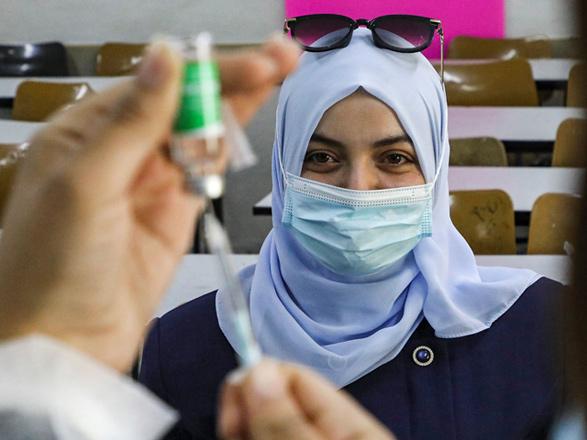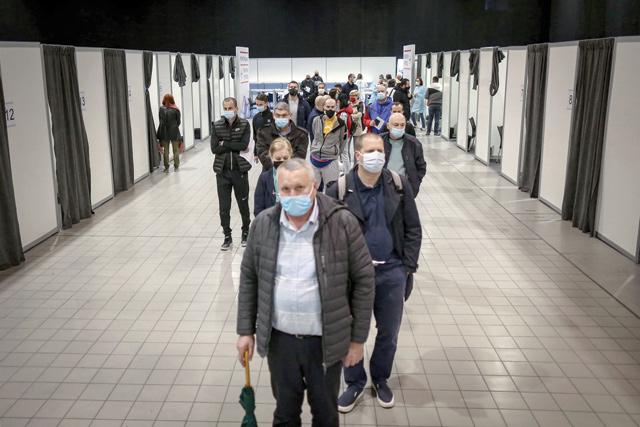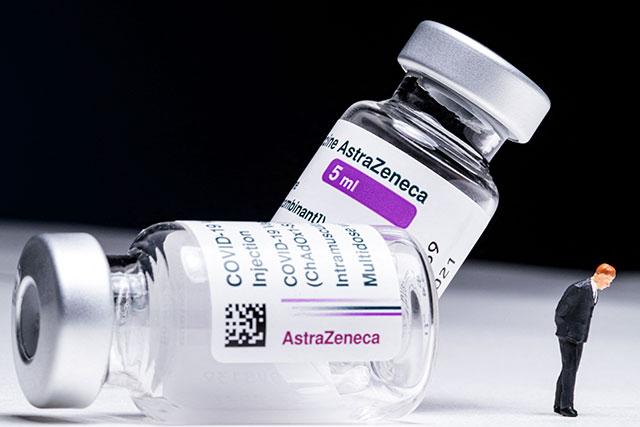You are here
Vaccine deliveries for poor nations delayed, as EU tackles shortfall
By AFP - Mar 25,2021 - Last updated at Mar 25,2021

Engineers of the French biotechnology company Fab'entech work at the laboratory of the group's factory in Saint-Priest, near Lyon on Thursday (AFP photo)
BRUSSELS — A co-founder of the global scheme to provide vaccines for poor people said onThursday that India was delaying exports of much-needed jabs, as EU leaders met for crisis talks in Brussels to try to solve supply issues on the badly-hit continent.
The fracas around vaccines threatens to slow a global immunisation drive that is seen as the way out of the pandemic, as third waves sweep several countries and force governments to reimpose tough anti-virus restrictions. At the centre of much of the vaccine controversy is AstraZeneca, which on Thursday said its jab was three percent less effective than previously thought, after being called out for publishing outdated data. AstraZeneca is also one of the main vaccines used in the Covax project, which supplies poorer countries with jabs, and is facing export delays in India where it is produced by the Serum Institute.
The Gavi alliance, a Covax co-founder, said deliveries of vaccines to lower-income economies will face delays because of a "setback" in obtaining export licences from the Indian government.
A Gavi spokesman said the licence delays "are due to the increased demand of Covid-19 vaccines in India".
The vast country recorded more than 50,000 new coronavirus cases on Thursday for the first time since November and is struggling to keep up with its own faltering vaccine drive at home.
"Covax is in talks with the government of India with a view to ensuring deliveries as quickly as possible," the Gavi spokesman said, without giving further details.
'Fair share'
The AstraZeneca shot was hailed as a breakthrough because it is cheaper and easier to store and transport than other Covid jabs. It is at the centre of the EU's vaccine woes, with an infuriated Brussels tightening export controls after the British-Swedish company failed to deliver the doses it had promised to the bloc.
EU leaders met via videoconference Thursday to discuss AstraZeneca supplies, as well as new vaccine export rules that will weigh how needy countries are in terms of infection rates, how many jabs they have, and how readily they export doses to the bloc.
EU Commission head Ursula von der Leyen released updated figures on how many vaccines the bloc has exported -- 77 million vaccine doses to 33 countries since December.
By contrast, 88 million doses will have been delivered in the 27-nation bloc by the end of this week, also since December.
But estimates for the second quarter of this year showed that 360 million doses should be delivered from BioNTech/Pfizer, Moderna, AstraZeneca and Johnson & Johnson.
"Together we will ensure that Europeans get their fair share of vaccines," von der Leyen tweeted.
The talks come as Germany, France, Belgium, Austria and The Netherlands tighten restrictions to control surges in cases.
Germany further bolstered rules on Thursday, saying travellers headed to the country by plane must show a negative Covid test before boarding. 'Together again'
The pandemic has claimed more than 2.7 million lives worldwide, hammered the global economy and left much of humanity under punishing restrictions.
But in some parts of the world, vaccinations have brought joy back after a tough year.
"We were just waiting to be all together again because we were really sad to be divided like that, floor by floor," said Lydie, a 91-year-old retirement home resident in France's Val-de-Marne, where vaccinations have allowed an easing of curbs.
"There was no joy. Now it's very good. We are happy."
Beyond supply and data issues, AstraZeneca has faced other challenges that have dented confidence.
The pharma giant was forced to review its US trials and then slightly revise down the jab's efficacy at preventing symptomatic Covid from 79 percent to 76 percent, after an American agency raised concerns about outdated information.
It remains 100 per cent effective against severe Covid, it added. Several countries paused the jab this month after reports of blood clots in people who had received the vaccine, but many resumed using it after the World Health Organisation and the European Medical Agency (EMA) said it was safe.
Despite the assurances, the EMA said Thursday it is convening a group of experts next week to look into incidents of blood clotting and "provide additional input into the assessment".
Denmark meanwhile said it would not resume the jab for at least three weeks as it had note ruled out a link to clots.
In contrast to the EU's woes, several countries have raced ahead with their vaccine drives -- including Israel which said on Thursday more than half of its 9.2 million people have received both doses of the Pfizer/BioNTech shot.
But the pandemic threat is far from over, illustrated by the recent decision to bar overseas fans from the already delayed Tokyo Olympics. The torch relay for the Games got off to a low-key start on Thursday and organisers hope it will build excitement.
But Tetsuya Ozawa, among a small group of fans, told AFP it was not much fun without spectators.
"There would have been more excitement if there wasn't coronavirus."
Related Articles
THE HAGUE — The EU's medicines regulator said Wednesday that blood clots should be listed as a rare side effect of the AstraZeneca (AZ) jab
GENEVA — The risk-benefit balance for the AstraZeneca COVID-19 vaccine is "still largely positive", the World Health Organisation said Tuesd
BRUSSELS — The European Commission is looking to launch legal action against AstraZeneca for underdelivering Covid-19 vaccine doses to the



















